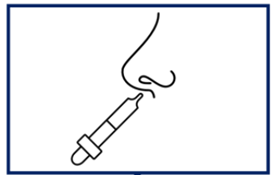Mucosal administration type vaccine
Nasal vaccines have the advantage of reducing anxiety about injections and reducing the burden on medical staff, but there are still many issues that need to be overcome, such as the method of spraying and adjusting the dose administered into the nasal cavity. In collaboration with Chiba University Hospital, SHIONOGI has founded the "Division for Human Mucosal Vaccine Research"* to address these issues and advance the development of effective intranasal vaccines from both clinical and non-clinical aspects. We're also exploring the development of oral vaccines for easier administration in the future.

* Shionogi Announces the Conclusion of a Contract for the Establishment of a Research
Department for Mucosal Vaccines with Chiba University Hospital. (Press Release, February 10, 2022)
https://www.shionogi.com/global/en/news/2022/2/e20220210.html
*1 AMED
AMED stands for the Japan Agency for Medical Research and Development. Established in 2015, it serves as the national hub for medical research and development in Japan.
*2 SCARDA
SCARDA stands for the Strategic Center of Biomedical Advanced Vaccine Research and Development for Preparedness and Response. The center is tasked with collecting and analyzing information related to vaccine development and providing the necessary funding to facilitate research and development initiatives.
